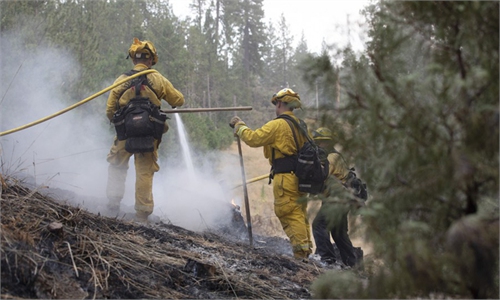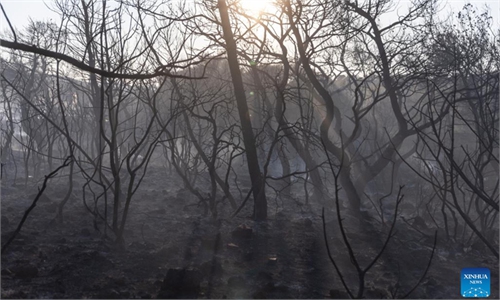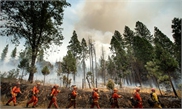After starting New Mexico fire, US asks victims to pay
After the US government started the largest wildfire in New Mexico's recorded history in April, it is asking victims to share recovery costs on private land, jeopardizing relief efforts, according to residents and state officials.
The blaze was sparked by US Forest Service prescribed fires to reduce wildfire risk. The burns went out of control after a series of missteps, torching 432 residences and over 530 square miles (1,373 square kilometers) of mostly privately owned forests and meadows, much of it held by members of centuries-old Indo-Hispano ranching communities.
"Today I'm announcing the federal government's covering 100 percent of the cost," US President Joe Biden said during a visit to New Mexico in June. Biden was announcing a disaster declaration that covered debris removal and emergency protective measures. But federal cost-sharing statutes on other federal relief programs are limiting Biden's authority and exposing holes in the government safety net meant to help survivors and restore landscapes.
Biden's measure was meant to bridge Federal Emergency Management Agency (FEMA) relief and a congressional bill that may pass in the fall to provide 100 percent federal compensation for losses from the so-called Hermit's Peak Calf Canyon fire.
Daniel Encinias was among survivors who met Biden and was told by US Department of Agriculture (USDA) officials he would get timely support at little or no cost. He, his wife Lori, three teenage children, four dogs and eight cats are living in a camping trailer next to the ashes of their home in Tierra Monte, 35 miles northeast of Santa Fe.
Encinias submitted an application to the USDA's Natural Resources Conservation Service (NRCS) to fix his well, but was told to share 25 percent of costs based on a federal statute that could not be waived as it did not fall under Biden's declaration.
Encinias said he was told by NRCS officials his application would be considered in September and recovery work would begin six to 12 months thereafter if he was accepted.
So like many fire survivors in this low-income area who have no insurance, the rancher and retired electrician did the work himself.
"Why the hell am I going to pay anything when I didn't cause this damn fire?" said Encinias, 55, as he fed his cattle hay he was forced to buy after his baler was torched.
For now, Encinias' family is getting by on a $37,000 maximum payout from FEMA for the loss of their five-bedroom home. They also lost eight acres of forest, farm machinery and cars.
"I'm hoping that finally something works out where it helps the people," said Encinias.
The blaze was sparked by US Forest Service prescribed fires to reduce wildfire risk. The burns went out of control after a series of missteps, torching 432 residences and over 530 square miles (1,373 square kilometers) of mostly privately owned forests and meadows, much of it held by members of centuries-old Indo-Hispano ranching communities.
"Today I'm announcing the federal government's covering 100 percent of the cost," US President Joe Biden said during a visit to New Mexico in June. Biden was announcing a disaster declaration that covered debris removal and emergency protective measures. But federal cost-sharing statutes on other federal relief programs are limiting Biden's authority and exposing holes in the government safety net meant to help survivors and restore landscapes.
Biden's measure was meant to bridge Federal Emergency Management Agency (FEMA) relief and a congressional bill that may pass in the fall to provide 100 percent federal compensation for losses from the so-called Hermit's Peak Calf Canyon fire.
Daniel Encinias was among survivors who met Biden and was told by US Department of Agriculture (USDA) officials he would get timely support at little or no cost. He, his wife Lori, three teenage children, four dogs and eight cats are living in a camping trailer next to the ashes of their home in Tierra Monte, 35 miles northeast of Santa Fe.
Encinias submitted an application to the USDA's Natural Resources Conservation Service (NRCS) to fix his well, but was told to share 25 percent of costs based on a federal statute that could not be waived as it did not fall under Biden's declaration.
Encinias said he was told by NRCS officials his application would be considered in September and recovery work would begin six to 12 months thereafter if he was accepted.
So like many fire survivors in this low-income area who have no insurance, the rancher and retired electrician did the work himself.
"Why the hell am I going to pay anything when I didn't cause this damn fire?" said Encinias, 55, as he fed his cattle hay he was forced to buy after his baler was torched.
For now, Encinias' family is getting by on a $37,000 maximum payout from FEMA for the loss of their five-bedroom home. They also lost eight acres of forest, farm machinery and cars.
"I'm hoping that finally something works out where it helps the people," said Encinias.



